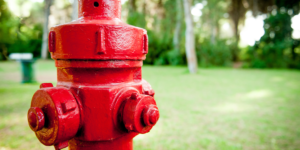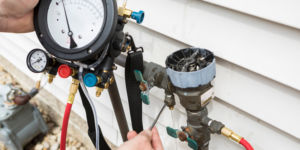Every homeowner needs to know about fire safety. Fires can destroy homes and families, so we want to safeguard them. Sprinkler systems help. These incredible technologies help contain fires and avert significant damage. We’ll explain sprinkler systems, how they function, and why adding one can make all the difference in home safety.
Understanding the Importance of Fire Safety in Homes
Home fire safety should never be overlooked. Fires spread swiftly and cause havoc.
The importance of home fire safety cannot be overstated. Fires endanger household residents. A little flame can quickly become an inferno; therefore homeowners must prioritize fire protection. Fires can destroy property greatly. A house fire can cause structural damage, loss of personal goods, and mental distress.
People who encounter home fires often suffer long-term trauma. Fire injuries may require considerable medical treatment, while emotional scars may take years to cure.
Proactive fire safety measures protect your house, neighbors, and community. Preventing house fires from spreading makes neighborhoods safer for everyone.
The Role of Sprinkler Systems in Home Fire Prevention
Home fire prevention relies on sprinklers. Fires are detected and extinguished before they spread and cause damage using these systems. Sprinklers can quickly extinguish fires and reduce injury and death.
Wet, dry, and pre-action household sprinkler systems are offered. Wet sprinkler systems are the most common and require steady water flow. Pressurized air or nitrogen replaces water in dry sprinkler systems until heat opens the valve. Pre-action systems use two triggers to discharge water, combining wet and dry systems.

Sprinklers activate automatically when smoke or heat sensors detect a fire. Water is distributed over the fire controls or extinguished.
Home sprinkler systems have many benefits beyond keeping flames from spreading quickly. Knowing you have extra disaster protection gives you peace of mind.
A dependable sprinkler system improves home fire safety, but it shouldn’t be your only defense. Installing smoke alarms in your home can alert you to emergencies.
Remember that a quality sprinkler system protects your family and property from devastating fires.
Types of Sprinkler Systems: Wet, Dry, and Pre-Action
Home fire protection relies on sprinkler systems. There are many types of sprinkler systems for your home, each with its own benefits.
Wet sprinklers are first. The simplest and most common sprinkler system. It has pipes packed with pressurized water to be released when a fire is detected. The heat from the fire activates sprinkler heads, which extinguish the flames.
Pre-action sprinklers mix wet and dry elements. In areas where unintentional discharge could cause substantial damage or disturbance, these are utilized. Before releasing water, pre-action systems need two triggers: smoke or heat detectors and fire detection.
Building structure, environment, occupancy requirements, and personal preferences determine which type to choose.
Understanding these sprinkler systems allows you to choose the ideal one for your needs, improving your home’s fire safety!
How Do Sprinkler Systems Work?
Understanding how sprinkler systems work might help you comprehend their importance in house fire safety. These systems work by activating sprinklers to control or extinguish fires. Sprinkler systems are usually connected to your home’s water supply and have pipes in each protected room. The sprinkler heads across the property have heat-sensitive parts that respond to high temperatures.
When a fire starts and the air temperature hits 135-165 degrees Fahrenheit, these components expand and let water through the sprinkler head. Only sprinklers directly exposed to heat will activate, unlike in movies and TV.
When an active sprinkler head starts flowing, it absorbs heat and cools the area, suppressing or extinguishing fires. This quick response stops fires from spreading and gives inhabitants more time to evacuate.
Benefits of Installing a Sprinkler System in Your Home
Home sprinkler systems are crucial for fire safety due to their many benefits. Sprinklers can minimize fire damage and save lives by responding quickly. Sprinklers activate automatically when they sense heat, unlike smoke detectors and fire extinguishers.
An excellent sprinkler system can also put out fires rapidly. Directly spraying water on the fire helps contain and control it. This greatly decreases property damage and allows occupants more time to escape.
A well-functioning sprinkler system gives homeowners peace of mind. Knowing you’ve taken precautions to protect your family and belongings is reassuring.
Maintaining and Testing Your Sprinkler System for Optimal Performance
To keep your home fire-free, you must maintain and inspect your sprinkler system. Regular maintenance detects system faults that could reduce efficiency. Important steps:
- Have a professional inspect your sprinkler system periodically. They will inspect pipelines for corrosion, leaks, and obstructions and ensure all components work.
- Test the sprinkler system alarm: To guarantee it triggers when needed, test the alarm periodically. Simulating a fire or employing specialist equipment can do this.
- Check water pressure: Sprinklers need enough water pressure. Regularly test and monitor water pressure to meet manufacturing standards.
- Clear the area: Furniture, decorations, and storage objects might block sprinkler heads from distributing water.
- Update documentation: Record sprinkler system maintenance, inspections, tests, and repairs. This information will aid future problem-solving.
You can rest easy knowing your sprinkler system will protect you and your property from fire by periodically maintaining and testing it.

Other Fire Safety Measures to Complement a Sprinkler System
In addition to installing a sprinkler system, you can take other fire safety measures to protect your house and family. Together with the sprinkler system, these methods create fire protection.
Installing working smoke alarms throughout your home is essential. These gadgets can detect smoke and fires rapidly, giving you time to exit safely. Check and replace smoke detector batteries periodically.
Keeping fire extinguishers in critical places of your home is another fire safety measure. Keep one near the kitchen and garage, where fires often originate. Learn how to use an extinguisher so you can handle a small fire.
Teach your family how to stop-drop-and-roll if clothing catches fire and not to play with matches or lighters.
Along with a dependable sprinkler system, these extra fire safety precautions can dramatically minimize the chance of disastrous residential fire damage and provide you and your family peace of mind.
